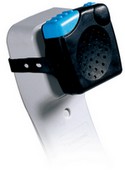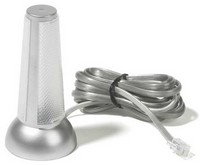

Independent Living Aids: The Telephone
Having telephone service is a necessity these days. We need the phone to conduct business, maintain social contacts, and report emergencies. Unfortunately, due to physical issues, not all seniors can use the phone as efficiently as they'd like. Consider these options to make phone use easier and more convenient:
Dialing Your Phone:
Touch tone phones with extra large touch pads are essential for those with arthritis or poor vision. Be sure the model can program your most frequently called numbers. You can find the phone that's right for you by calling your phone company, or in department and high tech stores.
Touch tone phones with extra large touch pads are essential for those with arthritis or poor vision. Be sure the model can program your most frequently called numbers. You can find the phone that's right for you by calling your phone company, or in department and high tech stores.
Your Telephone's Ring:
Those who are hard of hearing may have difficulty hearing their phone, even on the highest ring volume setting. If this describes your situation, try ordering an extra-loud ringer from your phone company. Or attach your phone to a light or flashing device for a visual notification that your phone is ringing. You can even use a portable device that vibrates when the phone rings. You can place it under your pillow, or keep it in your pocket.
Those who are hard of hearing may have difficulty hearing their phone, even on the highest ring volume setting. If this describes your situation, try ordering an extra-loud ringer from your phone company. Or attach your phone to a light or flashing device for a visual notification that your phone is ringing. You can even use a portable device that vibrates when the phone rings. You can place it under your pillow, or keep it in your pocket.
Telephone Amplifier:
You can increase the volume of your caller's voice by using an amplified handset. You can also use a similar device to amplify the sound of your voice, should you have weak speech (both are available from your local phone company). Users of hearing aids can use any telephone with a flux coil receiver simply by flipping the T-switch on their aid.
You can increase the volume of your caller's voice by using an amplified handset. You can also use a similar device to amplify the sound of your voice, should you have weak speech (both are available from your local phone company). Users of hearing aids can use any telephone with a flux coil receiver simply by flipping the T-switch on their aid.
First Things, First:
Look in the first few pages of your phone book. Under "special needs", there should be a number to call for information on equipment and services for the aged or disabled. The costs involved are usually quite reasonable.
Look in the first few pages of your phone book. Under "special needs", there should be a number to call for information on equipment and services for the aged or disabled. The costs involved are usually quite reasonable.

Above:
A portable telephone amplifier for the hard of hearing.
A portable telephone amplifier for the hard of hearing.

Above:
This device flashes a blue light whenever your phone rings.
This device flashes a blue light whenever your phone rings.


Home | Contact Us | Sitemap | Privacy Policy | Medical Alert Basics | Medical Alert Reviews | Submit A Review | Home Safety | Accident Prevention Independent Living Aids | Independent Living Advice
Copyright 2008-2010 Medical Alert Reviews
Copyright 2008-2010 Medical Alert Reviews
More Medical Alert Resources On MedicalAlertReviews.Com:
Medical Alert Basics
Special Features Of Medical Alert Systems
Guide To Independent Living
Home Safety
Preventing Accidents In The Home
Special Features Of Medical Alert Systems
Guide To Independent Living
Home Safety
Preventing Accidents In The Home
